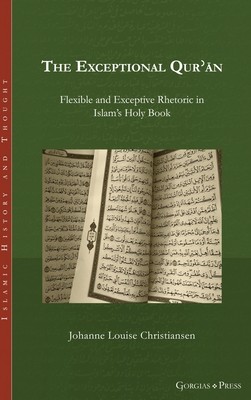
- We will send in 10–14 business days.
- Author: Johanne Louise Christiansen
- Publisher: Gorgias Press
- ISBN-10: 1463207298
- ISBN-13: 9781463207298
- Format: 15.2 x 22.9 x 2.1 cm, hardcover
- Language: English
- SAVE -10% with code: EXTRA
Reviews
Description
The Exceptional Qurʾān: Flexible and Exceptive Rhetoric in Islam's Holy Book is a synchronic, theoretical study of the Qurʾānic complex of exception and flexibility. Through analyses of rhetorical devices, including direct exceptions, recurring standardized arguments with a dispensatory aim, and modifying hypotheticals within the Qurʾān's legal discourse, the author argues that this complex seems to be - if not entirely unique - articulated in a new and deliberate manner as compared to previous scriptures: The Qurʾān continuously negotiates a balance between strictness and leniency, between principle and dispensation. Joining its philological results with the system theoretical framework of anthropologist Roy A. Rappaport, The Exceptional Qurʾān considers how such rhetorical strategies contributed to the systemic long-term durability of the Qurʾān, becoming the successful founding document of a religious community and discursive tradition.
EXTRA 10 % discount with code: EXTRA
The promotion ends in 20d.03:10:55
The discount code is valid when purchasing from 10 €. Discounts do not stack.
- Author: Johanne Louise Christiansen
- Publisher: Gorgias Press
- ISBN-10: 1463207298
- ISBN-13: 9781463207298
- Format: 15.2 x 22.9 x 2.1 cm, hardcover
- Language: English English
The Exceptional Qurʾān: Flexible and Exceptive Rhetoric in Islam's Holy Book is a synchronic, theoretical study of the Qurʾānic complex of exception and flexibility. Through analyses of rhetorical devices, including direct exceptions, recurring standardized arguments with a dispensatory aim, and modifying hypotheticals within the Qurʾān's legal discourse, the author argues that this complex seems to be - if not entirely unique - articulated in a new and deliberate manner as compared to previous scriptures: The Qurʾān continuously negotiates a balance between strictness and leniency, between principle and dispensation. Joining its philological results with the system theoretical framework of anthropologist Roy A. Rappaport, The Exceptional Qurʾān considers how such rhetorical strategies contributed to the systemic long-term durability of the Qurʾān, becoming the successful founding document of a religious community and discursive tradition.


Reviews